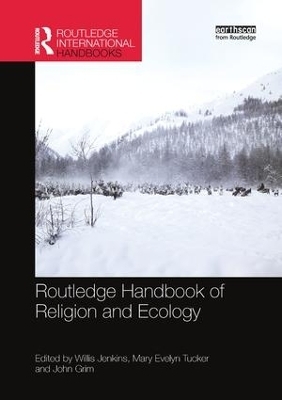
Routledge Handbook of Religion and Ecology
Routledge (Verlag)
978-1-138-31593-8 (ISBN)
The Routledge Handbook of Religion and Ecology provides the most comprehensive and authoritative overview of the field. It encourages both appreciative and critical angles regarding religious traditions, communities, attitude, and practices. It presents contrasting ways of thinking about "religion" and about "ecology" and about ways of connecting the two terms. Written by a team of leading international experts, the Handbook discusses dynamics of change within religious traditions as well as their roles in responding to global challenges such as climate change, water, conservation, food and population. It explores the interpretations of indigenous traditions regarding modern environmental problems drawing on such concepts as lifeway and indigenous knowledge. This volume uniquely intersects the field of religion and ecology with new directions within the humanities and the sciences.
This interdisciplinary volume is an essential reference for scholars and students across the social sciences and humanities and for all those looking to understand the significance of religion in environmental studies and policy.
Willis J. Jenkins is Associate Professor of Religion, Ethics, and Environment, University of Virginia, USA. Mary Evelyn Tucker and John Grim are Directors and Founders of the Forum on Religion and Ecology 1998 to present, as well as Senior Lecturers and Research Scholars at the School of Forestry and Environmental Studies and at the Divinity School, Yale University, USA.
Part 1 Introducing Religion and Ecology
1. The Movement of Religion and Ecology: Emerging Field and Dynamic Force Mary Evelyn Tucker and John Grim
2. New Developments in the Field Sigurd Bergmann
3. Whose Religion? Which Ecology? Willis Jenkins
Part 2 Global Traditions
Introduction: Mary Evelyn Tucker
4. Hinduism David Haberman
5. Buddhism Christopher Ives
6. Confucianism Yong Huang
7. Judaism Hava Tirosh Samuelson
8. Christianity Ernst Conradie
9. Islam Zainal Bagir and Najiyah Martiam
10. Bahai Peter Adriance and Arthur Dahl
11. Mormonism George Handley
Part 3 Indigenous Cosmovisions
Introduction: John Grim
12. Africa Jesse Mugambi
13. Asia Dan Smyer Yu
14. Pacific Region Manuka Henare
15. North America Melissa Nelson
16. Arctic Frederic Laugrand
17. Latin America Miguel Angel Astor-Aguilera
Part 4 Regional Landscapes
Introduction: Willis Jenkins
18. India Christopher Key Chapple
19. China James Miller
20. Latin America Anna Peterson
21. African Diaspora Melanie Harris
Part 5 Nature Spiritualities
Introduction: John Grim
22. Paganism and Animism Graham Harvey
23. Spiritual Ecology and Radical Environmentalism Leslie Sponsel
24. Nature Writing and Nature Mysticism Douglas Christie
Part 6 Planetary Challenges
Introduction: Willis Jenkins, University of Virginia
25. Climate Change Mike Hulme
26. Biodiversity Thomas Lovejoy
27. Oceans Carl Safina and Patricia Paladines
28. Conservation and Restoration Gretel van Wieren
29. Food and Agriculture Whitney Sanford
30. Water Christiana Peppard
31. Animals Paul Waldau
32. Population Robert Wyman and Guigui Yao
33. Consumption Laura Hartman
34. Gender Injustice Heather Eaton
35 Environmental Justice David Pellow and Pengfei Guo
Part 7 Disciplinary Intersections
Introduction: Mary Evelyn Tucker
Environmental Humanities
36. History Donald Worster
37. Literature Scott Slovic
38. Philosophy Baird Callicott
39. Art Subhankar Banerjee
Environmental Sciences
40. Policy Maria Ivanova
41. Law John Nagle
42. Economics Richard Norgaard with Jessica Goddard and Jalel Sager
43. Ecology Nalini Nadkarni
| Erscheinungsdatum | 27.08.2018 |
|---|---|
| Reihe/Serie | Routledge Environment and Sustainability Handbooks |
| Zusatzinfo | 1 Tables, black and white; 5 Line drawings, black and white; 1 Halftones, black and white; 7 Illustrations, black and white |
| Verlagsort | London |
| Sprache | englisch |
| Maße | 174 x 246 mm |
| Gewicht | 771 g |
| Themenwelt | Geisteswissenschaften ► Religion / Theologie |
| Naturwissenschaften ► Biologie ► Ökologie / Naturschutz | |
| ISBN-10 | 1-138-31593-1 / 1138315931 |
| ISBN-13 | 978-1-138-31593-8 / 9781138315938 |
| Zustand | Neuware |
| Haben Sie eine Frage zum Produkt? |
aus dem Bereich


